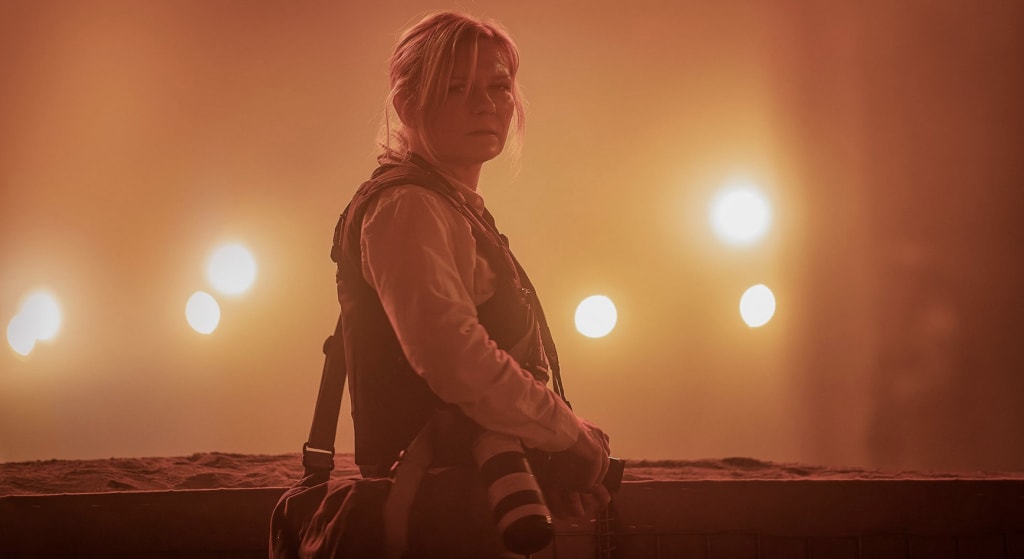Civil War Is a Divisive Ode to a Divided Country
Alex Garland's new film prophesies an eerily relatable story of a not-so-distant America

Civil War is a movie that's every bit as polarizing as its name implies. Directed by Alex Garland and set in a hypothetical near-future United States, there are few Americans who can watch it without feeling something. Whether that something is disgust, numbness, fear, enthusiasm, or indignation will depend on each viewer.
Garland, the director of Ex Machina, borrows a few of the most effective devices from his debut movie to create a similar feeling of suspense in Civil War. But where Ex Machina is slow-rolling and cerebral, Civil War is high-octane and bombastic. In Ex Machina, knives pierce like butter; in Civil War, weapons fire in theater rattling cannonades and abrasive bangs signal the abrupt arrival of new scenes.
One of the biggest criticisms leveled against Civil War is its lack of realism. Honing in on the specific borders of these battle lines raises its share of questions when you consider that Texas is battling alongside California.
Going off of more scathing critiques of the movie, I thought it might be little more than an ill-conceived excuse for spectacle. I was worried I might be walking into just a soulless follow-up to Roland Emmerich's White House Down. But the tone of the two projects could scarcely be more diametrically opposed.
The film makes a concerted decision never to focus in on the specific sides of the conflagration, or even the reasons why the disparate regions of the country are fighting to begin with. Astutely avoiding the subject in its entirety, it drives home the point that the reasons for war are often irrelevant.
Yet, even still, there's something eerily - painstakingly - believable about the war the movie depicts. Especially as a lifelong resident of Northeastern United States, the calamity portrayed all along the country's interstates reveals a dejection and despair that it's difficult to watch. Adding a macabre sort of character to the movie was the parent seated behind us who injudiciously decided to bring his 5 year old along for the ride.
"Daddy, why are they taking pictures?" he asked.
"Daddy, why did they just shoot him?" he pleaded.
They left before the movie reached its halfway marker.
The sounds of bullets and explosions are shell-shocking. The littered cars along the very roads I've traveled myself bring to life a possible reality that more and more Americans have been forced to envision in our collective minds in recent years.
Though the reasons for the civil war are never laid out in any detail, the resulting chaos is scarily feasible. Between parties, there are times when our animosity toward one another feels almost blind. The hatred runs as deep as our DNA. It's hardly every American, though, that can truly articulate why.
Another criticism some people have raised with the movie is that it's too realistic in its depiction of the strife that this next election might bring. They fear it could have a radicalizing effect. But the other side of that coin is that Civil War tells a cautionary tale. It tells the story of all that we have to lose as a country - divided as we may feel now. It shows the world in which the fissures of our nation widen only a few feet further.
Though not many Americans are happy about the government and the people running it, the movie gives us a reason to revel in our structured society. It grants viewers a reason to be thankful for the roofs over our heads and the ability to stop for gas without fearing for our lives.
But there is a type of audience that might romanticize trading missiles on American soil. They might see something enticing in the idea of roaming the streets with semi-automatics and waging war in our nation's capital. The concern that the film could result in real-world consequences isn't unfounded.
Civil War is a grating, humorless, un-moralizing, and nightmarish masterpiece. It's not devoid of take-home points, but it doesn't try to hammer home any direct conclusions. It attempts mostly to be a lifelike realization of what war in our country may look like. In the process, it shines a glaring light on the harsh realities of conflict journalism.
The movie features an abrupt ending in place of a slow decrescendo that many find jarring. But there's also a stark immediacy to it that serves the plot well.
As a viewer, I've never been particularly drawn toward war movies. Both Saving Private Ryan and Dunkirk never managed to capture my heart with their gritty, colorless depictions of conflict. Even while I never loved either film, I could acknowledge their greatness. They were unrelenting in their realistic portrayals of the horrid lows of warfare. But being set in such distant pasts, both movies bred a certain disconnect. The struggles were realistic, but not relatable.
Set in present-day adjacent America, Civil War achieved heights for me that no story of war had ever managed. There's a visceral sort of empathy that the film elicits in so many American viewers. It's a brutal personification of many of our worst fears and anxieties. Even though it doesn't depict events that have ever taken place, it felt infinitely more personal than movies that had.
Through Kirsten Dunsts' gut-wrenching range of emotion - spanning from a relatable numbness and stoicism to an unrestrained flow of anguish - it pulls feelings from audiences that have likely lain dormant. Life in America can have a desensitizing effect, and Civil War encourages us to consider where our indifference could lead. It hopes to create a catharsis out of this mass sense of paralysis our country has been facing. It wants tears to flow from bleary eyes.
Jesse Plemons plays a short role in the film. But in characteristic fashion, he instills it with such a deadpan and mercurial force that it leaves viewers on the edge of their seats for his entire moment on screen. The scene is only a few minutes in length, but musters almost all the tension of a real-world hostage negotiation.
Once the war reaches the White House, there's something utterly disquieting about the scene. We're forced into a rapt silence as our nation's most esteemed building is besieged, surrounded, and riddled with bullets. As the sacred halls are patrolled by the forces of an opposing army, the screen turns into something that's at once haunting and magnetic.
Whether the more climactic events of Civil War will ever come to pass is mere speculation, but Garland's horrendous, nail-biting spectacle of a film gives Americans reason to fear what might happen if the divisions in our country continue to worsen.
About the Creator
Ben Ulansey
Ben is a word enthusiast who writes about everything from politics, religion, film, AI and videogames to dreams, drones, drugs, dogs, memoirs, and terrorizing Floridians with dinosaur costumes.






Comments
There are no comments for this story
Be the first to respond and start the conversation.